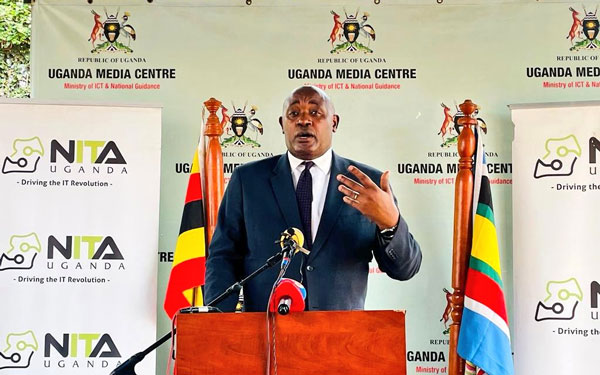
Kampala, Uganda | THE INDEPENDENT & URN | Minister for ICT and National Guidance Chris Baryomunsi has announced a 50% reduction in the price of the internet.
“I’m delighted to announce that effective today 1st of August 2023 the Price of the Internet has reduced from $70 to $35 per Mbps per month,” Baryomunsi said at a press briefing together with the National Information Technology Authority (NITA Uganda) at the media centre today.
Baryomunsi added that, “Our actions today will inspire Private Internet Service Providers to follow suit, ultimately benefiting all Ugandans with more affordable and accessible Internet services for its unprecedented opportunities in innovation growth and development.”
NITA ED Dr Hatwib Mugasa was optimistic that the general outcome of the price cut is expected to help spur digitization, e-services absorption and growth of Internet usage across the country.
“We anticipate that the ripple effect of the Government price cut is expected to influence the average market cost and subsequently lower end user tariffs for business and citizens,” Dr Mugasa said.
Minister Baryomunsi hailed NITA for expeditiously implemented the first phases of the National Data Transmission Backbone Infrastructure project (NBI) to serve as the primary vehicle for all Government data, Internet, and voice services.
He said the the use of the NBI as a secure highspeed network for the government has led to lowering the cost of communication across the Government and further enabled the extension of the geographic reach of broadband networks across the country.
“I would like to note that this price reduction means Government Offices connected to the NBI will consume internet at the lowest price in the market. This landmark achievement solidifies Government`s position as the undisputed market leader in setting Internet prices. With this bold move, NITA-U will drive substantial savings on the government’s communication budget, catalyze the adoption of E-Government Services, and deepen Digitization.”
Previously, internet prices were about $1,200 per MBPs then were reduced prices to 600 $ in 2014 and a further $300 in 2016 as more Government MDAs and public offices were connected to the National Backbone Infrastructure. The National Backbone now extends to all regions of the country spanning 4,300km extending connectivity to around 4,360 Government office.
NITA-U Executive Director Dr Hatwib Mugasa, added that there is an expectation that the cost of internet offered by Nita-U will continue to decrease in the coming years. This anticipation is based on the agency’s plans to roll out the Uganda Digital Acceleration Project-UDAP which will extend internet coverage from the current 53 major districts and ten border points to the entire country, including every parish.
According to a 2022 research report by Surfshark, a cybersecurity company based in the Netherlands, Uganda ranks 116th out of 117 countries surveyed in terms of internet affordability. This indicates that internet services in Uganda are not affordable when compared to global standards.
In September 2019, Cable.co.uk, a Broadband, TV, and Mobile Phone Price Comparison Site based in the UK reported that Ugandans paid one of the highest prices for mobile data in the East African region. According to their findings, the cost of 1GB of data in Uganda was USD 4.69 (equivalent to 17,231 Shillings). This placed Uganda second-highest in terms of data prices in East Africa, with Tanzania having the highest cost of 1GB at USD 5.93 (22,000 Shillings) during that period
The low internet penetration in Uganda has been attributed to several factors. One of the main reasons is the high cost of internet and smartphones. These expenses can be prohibitive for a significant portion of the population, making it challenging for them to access and use the internet regularly. Furthermore, the lack of adequate infrastructure, particularly in remote and rural areas, contributes to the low internet penetration in the country.
 The Independent Uganda: You get the Truth we Pay the Price
The Independent Uganda: You get the Truth we Pay the Price



